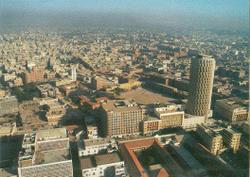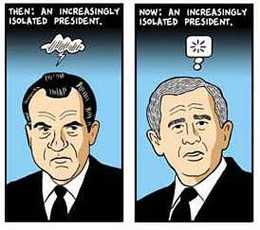One key difference between the TV era we’re leaving and the Internet era we’re entering lies in the "Great Man" theory of history.
In TV World, the camera must be on one person. There is always just room for one story.
In the last few years, as the Internet has come to mean more to us, the insanity of this attitude has become apparent. First, with O.J, then with Monica, and now with just about every story TV chooses to obsess on.
This is especially true when it comes to politics. One man, one House, one set. The TV has room for no more than that. This has helped concentrate power in one person, even when that person was, as this President is, a worthless piece of shit. It has also helped create the explosion of "horserace" coverage. Since all that matters is the identity of the face in front of the camera, the minutiae involved in getting someone in front of that camera becomes the only story.
The world doesn’t work that way. The Internet certainly doesn’t. Even the most important site in the world, Google.Com, is merely a conduit, a connection on the way to somewhere else, an enabler. Yet notice how the business press has covered Google as though it were a destination, just as it pushed Yahoo into being a destination, just as it pushed Microsoft as a destination. One camera, one destination, one story. TV assumptions are everywhere.
Which brings us to the news of the day. Benazir Bhutto was a product of the TV age, imbued by TV values with TV qualities of perfection and importance. Her death led to a paroxysm, not just on the streets of Pakistan but on the TV, because there was just one camera, one story, and there could be just one heroine in the TV storyline. She knew this, and spent her last months manipulating it, maneuvering herself into the role of alternative to Pervez Musharraf, whom everyone knew was hopelessly flawed. Everything was set, in a TV world, for her to assume power.
But the lesson of her death, for Pakistan and for us, should be this. Life ain’t TV. We imbue a single center with all power at our peril. It’s like love. She’s not perfect, he’s not perfect, no one is perfect. No one person can hold all power and lead righteously, unless they are themselves perfect. And no one is perfect.
Instead of the Great Man or Great Woman Theory, the Internet offers
an alternative. Call it the wisdom of crowds. Call it McWorld, if you
like. Call it the ability to collectively organize, across borders and
across cultures.
It’s happening in business. It’s happening in society. It’s
happening in entertainment. It’s not atomization. It’s people empowered
to find just what interests them, to find peers who share those
interests, and to build communities around those interests which allow
those interests to advance much more rapidly than they could otherwise.
Think of how open source projects work. No Drupal heads in your
town? In a TV world you’re out of luck. But in the Internet world voila
— there they are.
This has enormous implications for politics. It makes individuals
like Benazir Bhutto far less important. It makes those who
self-organize to do good things more important. The institutions of
civil society, modeled and built using Internet tools, are the real
model for our future. We will find the flaws in this model eventually,
real flaws demanding the creation of new models.
Thus I return again to Tariq Mustafa.
Not Mustafa the man, but what he represents. Civil society. Business
organization. Internet connectivity. There are literally millions of
men and women like Tariq all over Pakistan, good people doing good
work, self-organizing, building businesses and institutions across
lines which formerly divided them. Tariq himself might be in the picture above, which shows his hometown of Karachi, Pakistan. Or maybe not.
That’s the greatest difference between the era we are leaving and the era we are entering. Al Qaeda uses that power to kill, on behalf of a single center. But the future has no center, and it has billions of builders. It can’t really be stopped.
Bhutto was the past, the politics of TV. Mustafa is the future, him
and all those like him everywhere in the world. You can’t kill that future by killing one man.
You can only doing it by turning off the Internet itself. And building
a bridge to the 14th century with no way back.
The revolution is not being televised. You’re soaking in it.












